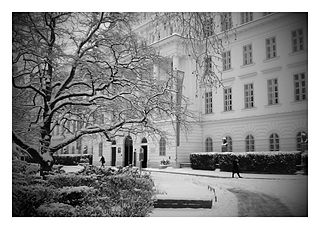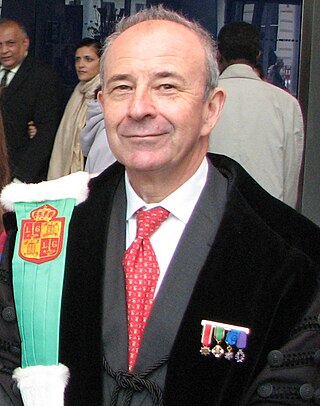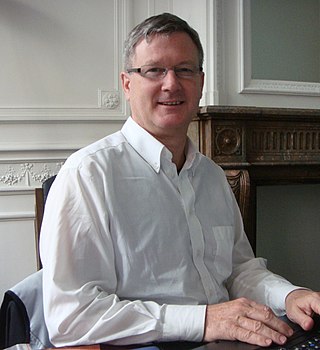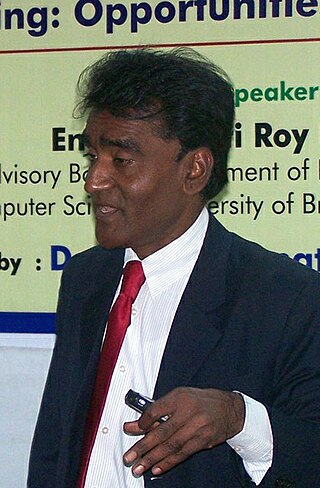Related Research Articles

The École centrale de Lyon (ECL) is a research university in greater Lyon, France. Founded in 1857 by François Barthélemy Arlès-Dufour in response to the increasing industrialization of France, it is one of the oldest graduate schools in France. The university is part of the Grandes Écoles, a prestigious group of French institutions dedicated to engineering, scientific research, and business education. The current 45-acre campus opened in 1967 and is located in the city of Ecully.

Wrocław University of Science and Technology is a technological university in Wrocław, Poland. With buildings and infrastructures dispersed throughout the city, its main facilities are gathered at a central location near Plac Grunwaldzki, alongside the Oder river. It operates three regional branches in Jelenia Góra, Legnica, and Wałbrzych. Huffington Post UK named Wrocław University of Science and Technology in the top 15 of the World’s Most Beautiful Universities Rankings.

Instituto Superior TécnicoMHSE • MHIP is a public school of engineering and technology, part of University of Lisbon. It was founded as an autonomous school in 1911, and integrated in the Universidade Técnica de Lisboa in 1930. IST is the largest school of engineering in Portugal by number of enrolled students, faculty size, scientific production and patents.

TU Wien is one of the major universities in Vienna, Austria. The university finds high international and domestic recognition in teaching as well as in research, and it is a highly esteemed partner of innovation-oriented enterprises. It currently has about 28,100 students, eight faculties and about 5,000 staff members.

Charles Elachi is a Lebanese-American professor (emeritus) of electrical engineering and planetary science at the California Institute of Technology (Caltech). From 2001 to 2016 he was the 8th director of the Jet Propulsion Laboratory and vice president of Caltech.

Jacek M. Zurada serves as a Professor of Electrical and Computer Engineering Department at the University of Louisville, Kentucky. His M.S. and Ph.D degrees are from Politechnika Gdaṅska ranked as #1 among Polish universities of technology. He has held visiting appointments at Swiss Federal Institute of Technology, Zurich, Princeton, Northeastern, Auburn, and at overseas universities in Australia, Chile, China, France, Germany, Hong Kong, Italy, Japan, Poland, Singapore, Spain, and South Africa. He is a Life Fellow of IEEE and a Fellow of International Neural Networks Society and Doctor Honoris Causa of Czestochowa Institute of Technology, Poland.

The Technical University of Crete is a state university under the supervision of the Greek Ministry of Education and was founded in 1977 in Chania, Crete. The first students were admitted in 1984. The purpose of the institution is to conduct research, to provide under-graduate and graduate educational programs in modern engineering fields as well as to develop links with the Greek industry. It is highly ranked among the Greek technical universities in terms of research productivity, research funding, scientific publications and citation per faculty member. It uses Daedalus as part of the emblem.

Sami Erol Gelenbe is a Turkish and French computer scientist, electronic engineer and applied mathematician who pioneered the field of Computer System and Network Performance in Europe, and is active in many research projects of the European Union. He is Professor in the Institute of Theoretical and Applied Informatics of the Polish Academy of Sciences (2017-), Associate Researcher in the I3S Laboratory and Abraham de Moivre Laboratory. He has held Chaired professorships at University of Liège (1974-1979), University Paris-Saclay (1979-1986), University Paris Descartes (1986-2005), Nello L. Teer Professor and ECE Chair at Duke University (1993-1998), University Chair Professor and Director of the School of EECS, University of Central Florida (1998-2003), and Dennis Gabor Professor and Head of Intelligent Systems and Network, Imperial College (2003-2019). He invented the random neural network and the eponymous G-networks. He has served as a consultant to Thomson-CSF, IBM, BT, France Telecom, Huawei, and General Dynamics. His awards include the Parlar Foundation Science Award (1994), the Grand Prix France Telecom (1996) of the French Academy of Sciences, the ACM SIGMETRICS Life-Time Achievement Award, the Oliver Lodge Medal, the "In Memoriam Dennis Gabor Award", and the Mustafa Prize (2017).

The Ira A. Fulton Schools of Engineering is the engineering college of Arizona State University. The Fulton Schools offers 25 undergraduate and 48 graduate degree programs in all major engineering disciplines, construction and computer science.
Fawwaz T. Ulaby is Arthur F. Thurnau Professor of Electrical Engineering and Computer Science at the University of Michigan in Ann Arbor and formerly the Founding Provost and Executive Vice President of the King Abdullah University of Science and Technology (KAUST) and R. Jamieson and Betty Williams Professor of Electrical Engineering and Computer Science at the University of Michigan.
International Conference on Interactive Computer Aided Learning (ICL) is an annual International Association of Online Engineering (IAOE) conference.

Bernhard M. Hämmerli is a Swiss computer scientist in the fields of communications, networks and information security, specifically critical infrastructure protection in the European Union. He is teaching internationally, as a professor at both the Lucerne University of Applied Sciences and Norwegian University of Science and Technology. He was president of the Swiss Informatics Society from 2009 to 2014 and chair of the platform ICT Security of the Swiss Academy of Engineering Science from 2012. He has directed a new academic course Cyber Security at the Lucerne School of Information Technology from 2018.
Remote laboratory is the use of telecommunications to remotely conduct real experiments, at the physical location of the operating technology, whilst the scientist is utilizing technology from a separate geographical location. Remote laboratory comprehends one or more remote experiments.
Labshare consortium is a laboratory sharing initiative established by the Federal Commonwealth of Australia Government's Department of Education, Employment and Workplace Relations by their Diversity and Structural Adjustment Fund awarded the five Australian Technology Network Universities: University of South Australia, Royal Melbourne Institute of Technology, University of Technology Sydney, Curtin University of Technology and Queensland University of Technology, which supported the national sharing of remote labs as a consortium of Australian Technology Network Universities who would share remote laboratories.

Electronics engineering is a sub-discipline of electrical engineering which emerged in the early 20th century and is distinguished by the additional use of active components such as semiconductor devices to amplify and control electric current flow. Previously electrical engineering only used passive devices such as mechanical switches, resistors, inductors and capacitors.

Harold Vincent Poor FRS FREng is the Michael Henry Strater University Professor of Electrical Engineering at Princeton University, where he is also the Interim Dean of the School of Engineering and Applied Science. He is a specialist in wireless telecommunications, signal processing and information theory. He has received many honorary degrees and election to national academies. He was also President of IEEE Information Theory Society (1990). He is on the board of directors of the IEEE Foundation.
Mangalore Anantha Pai is an Indian electrical engineer, academic and a Professor Emeritus at the University of Illinois at Urbana–Champaign. A former professor of electrical engineering at the Indian Institute of Technology, Kanpur, he is known for his contributions in the fields of power stability, power grids, large scale power system analysis, system security and optimal control of nuclear reactors and he has published 8 books and several articles. Pai is the first India born scientist to be awarded a PhD in Electrical Engineering from the University of California, Berkeley.
Frank L. Lewis is an American electrical engineer, academic and researcher. He is a professor of electrical engineering, Moncrief-O’Donnell Endowed Chair, and head of Advanced Controls and Sensors Group at The University of Texas at Arlington (UTA). He is a member of UTA Academy of Distinguished Teachers and a charter member of UTA Academy of Distinguished Scholars.

Bibhuti Roy is an engineer and professor. He is a researcher at the University of Bremen at the ITB in the Department of Computer Science and Engineering and a visiting professor at international universities. His research interests include Computer Based Training, Curriculum development, Biotechnology for sustainable water supply, decentralized energy production and storage and Solar Energy Production Facility and Maintenance.